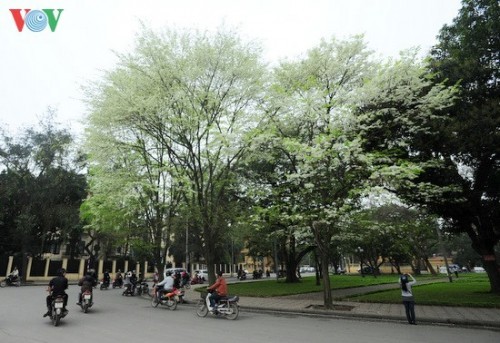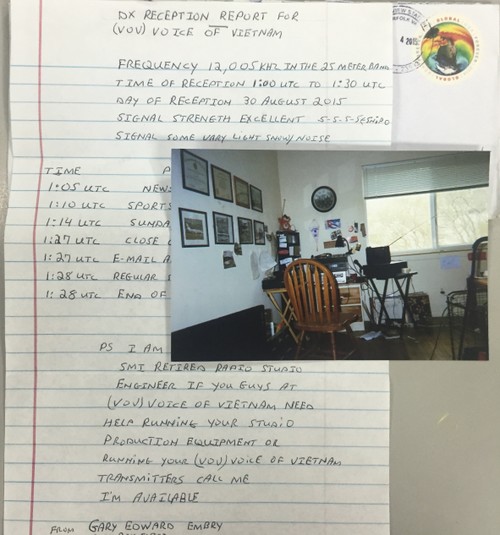(VOVworld) - Spring has arrived in northern Vietnam, bringing with it high humidity and drizzles. The average temperature in Hanoi ranges from 20 to 25 DC these days. This weather is great for the plants to grow and the flowers to blossom.
B: But the high humidity is not good for Hanoians. The most immediate effect of high humidity is personal discomfort. Everything in my house appears to be sweaty. A humid environment is a breeding ground for all sorts of microscopic organisms that can harm your health. It can cause coughing, asthma, and allergies. I’m longing for the sun.
 |
| Sua flowers blossom in March |
A: Well, the weather forecast says the last monsoon will come later this week and northern provinces will get colder. Humid, wet days and the sweaty feeling will end soon. Meanwhile, Vietnam’s central, central highland, and some Mekong Delta provinces are suffering from acute drought and saline intrusion.
B: Yes, the situation is serious. The water flow in major rivers in the Central Highlands is 20-70 percent below normal. The current water volume in many reservoirs has fallen to 30-60 percent of design capacity. More than 7,000 ha of rice in the region have been abandoned due to a shortage of water, and another 5,400 hectares have been damaged. If rain does not come by the end of this month, the drought area will triple.
 |
| A dried field in the Central Highlands |
A: Local authorities have reported that nearly 18,000 households lack water for personal use. And forest fire risk in the region is at an extremely dangerous level.
B: Severe drought and saltwater intrusion in the Mekong Delta has badly affected agriculture and aquaculture, threatening a scarcity of raw materials for seafood exports. All 13 provinces in the Mekong Delta region have incurred losses caused by saline intrusion. Shrimp farmers in Ben Tre, Tra Vinh, Soc Trang and Kien Giang province are nervous because their shrimp keep dying from the drought and saltwater intrusion up the rivers.
A: The government’s assistance to drought and saltwater intrusion areas is being supplemented by local donations. Hanoi has sent financial aid worth 850,000 USD to the hardest-hit Central Highlands, south central, and Mekong Delta localities. The Viet Red Cross Society, banks, humanitarian organizations, and private companies have also provided emergency relief to residents in central, Central Highlands and Mekong Delta provinces.
B: Now let’s read some of the listeners’ letters we received during the week. Alex Torbeni of Indonesia sent us a reception report for the program on March 17 on 9840 khz. Alex wrote: “The commentary on the new president of Myanmar was interesting. Although Myanmar is one of the ASEAN members, many people in ASEAN countries outside Myanmar do not know what’s happening in Myanmar.”
A: Thank you, Alex, for your comment. VOV’s World Service runs a daily commentary on major events in Vietnam and the world. VOV, a key player in Vietnam’s media, advocates the vision of the ASEAN Economic Community to develop a highly integrated and cohesive economy, a resilient, inclusive, people-oriented, and people-centred ASEAN, and a global ASEAN.
B: Here I have an email from Carlie Forsythe of Wisconsin, the US. Carlie says she heard the news on February 27 covering VNese free trade agreements, the celebration of Vietnam’s Physicians’ Day, China’s militarization in the East Sea, and a potential trade embargo of North Korea. The signal was very good on the frequency of 6175 khz with a SINPO rating of 43344.
A: Carlie wrote: “Until now I had no idea that Vietnam celebrates a physicians’ day. Very interesting! I had also never heard the disputed sea called the East Sea before. Usually the name given in the west is the South China Sea. As the saying goes, you learn something new every day.”
B: The South China Sea is a marginal sea that is part of the Pacific Ocean, encompassing an area from the Singapore and Malacca Straits to the Strait of Taiwan of around 3,500,000 square kilometres. The area's importance is largely due to the fact that one-third of the world's shipping sails through its waters and it is believed to hold huge oil and gas reserves beneath its seabed.
A: South China Sea is the dominant name used in English, and the name in most other European languages is equivalent, but it is sometimes called by a different name by China's neighbors, reflecting historical claims and the position of the sea relative to the claiming country. China calls it the South China Sea. Vietnam uses the term “the East Sea” to refer to the part of the Pacific Ocean east of Vietnam and within Vietnam’s exclusive economic zone.
 |
A letter from Gary Edward
|
B: I’m reading a letter from American listener Gary Edward, who sent us a reception report for the program on August 30, 2015. He said the signal was excellent with SINPO rating all 5s. Gary is a 72-year-old retired radio studio engineer. He says if VOV needs help running studio equipment or transmitters, call him and he’s available.
A: Thank you very much, Gary, for your offer. Until we call you, we hope you’ll continue monitoring our broadcasts and sending us your feedback. It’ll help our staff resolve technical issues.
B: Richard Nowak of the US emails us almost daily to tell us his thoughts about our programs. On March 14, he emailed us to say “The show on 6175 khz from 1:00 to 1:27 was great. Richard used a Hallicrafters SX-28 hooked up to an off-center-fed dipole with an overall length of 41 meters.
A: Richard noted the major topics, including Vietnam-Mozambique cooperation, IS chemical attacks in Iraq, and Cuba welcoming 1 million tourists. He said “the news was informative. The great Sunday show discussed a festival for ethnic minorities, spring flowers blossoming, women dressing up for the festival, and men wearing traditional clothes. The Sunday Show was very interesting and gave us a better understanding of Vietnam’s traditions. A nice folk song ended the show.”
B: Thank you, Richard, for listening to VOV every day and sending us regular feedback. We’ll verify your report very soon. Eddy Prabowo of Indonesia reported listening to VOV on March 6 on the frequency of 7280 khz. His equipment is a SANGEAN ATS 909 X with a wire approximately 99 meters long hanging 100 meters above sea level.
A: Muralidhar of India emailed us saying “I have been a loyal listener to VOV since 1993, when I was in high school. Those days listening to the friendly voices of VOV made me curious and gave me a deep appreciation of the Vietnamese land and culture. I’m happy to say that even today I have the same curiosity to learn about Vietnam and its people. I have a small collection of VOV paper pennants. They are simple yet beautiful.”
B: It’s great to have such a loyal listener as you, Muralidhar. We’ll verify your report by sending our QSL card to add to your collection. We’ve already verified reports from Jim Savier of the US, Toshiya Nishimura, Miyoshi Tyo, and Koji Nakayama of India, Peter Ng of Malaysia, and Rachid Dahmani of Algeria. We hope you’ll receive your QSL cards soon.
A: Thank you all very much for your reception reports, listeners. We welcome your feedback. Please send reports to English Section, Overseas Service, Voice of Vietnam, 45 Ba Trieu Street, Hanoi, Vietnam. Our email address is englishsection@vov.org.vn. Thank you for listening. Join us again next Wednesday for another Letter Box show. Goodbye from both of us to all of you.